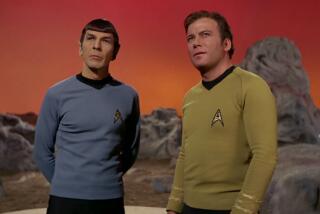Universe Has No Fury Like a Trekkie Scorned
Re “Strange New World: No ‘Star Trek,’ ” Commentary, May 3: Orson Scott Card claims that the popularity of the “Star Trek” franchise over the years was due to the fact that the public was starving for science fiction but at the same time was largely unsophisticated in its tastes for the genre.
To the contrary, it is Card who has failed to achieve a stable orbit. The reason for Gene Roddenberry’s success is that it captured a positive vision of the future.
“Star Trek,” together with the 1968 Stanley Kubrick film “2001: A Space Odyssey,” arose during the ‘60s, a decade of hope in the midst of a culture beset with war, racism and sexism. In the “Star Trek” universe, problems such as poverty, greed, racism, sexism, interference in other cultures and humans making war on humans were resolved.
The science fiction to which we are subjected, of which Card thinks so highly, is present-day capitalism intensified with futuristic technology, presenting a bleak and frightening future that no one really wants to live in. The cancellation of the current “Star Trek” show with no replacement on the horizon is a reflection of the dark rightward shift of American society.
No “Star Trek” means no hope for millions of people in the world.
E. Douglas Kihn
West Los Angeles
*
Card implies that viewers watched the series because they had never read good science fiction and that “Star Trek” “was grade school for those who had let the whole science fiction revolution pass them by.” Darn! Then how does Card explain why those of us who did read science fiction also enjoyed the series?
Roy Wilson
West Covina
*
“Star Trek” was, “with a few exceptions, bad in every way that a science fiction television show could be bad.” Obviously Card must not have seen a single episode of “Lost In Space”!
Lewis Schoenbrun
Culver City
More to Read
The complete guide to home viewing
Get Screen Gab for everything about the TV shows and streaming movies everyone’s talking about.
You may occasionally receive promotional content from the Los Angeles Times.






